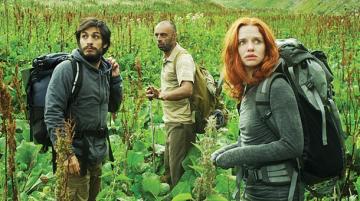Movie review: 'Loneliest Planet' a tedious trek through an emotional badlands
How do you forgive someone who can't or won't ask to be forgiven?
That's the key issue in life and in "The Loneliest Planet," an exotic tale of accidental betrayal, set in the strange wilderness of Georgia's Caucasus Mountains.
It's not Jimmy Carter's Georgia. But it's constantly on the mind of Alex (Gael Garcia Bernal) and Nica (Hani Furstenberg), a wildly in love young American couple who go there for a backpacking adventure the summer before their wedding.
We meet her first, in the film's opening shot, jumping up and down stark naked in a bathing tub as he pours warm water over her bright red hair. A scene or two later, she does chin-ups inside a bus -- strong, athletic, sexy thing that she is! -- and then beats him in a headstand contest. He grabs her and makes love. They're like two passionate puppies, openly and deliriously enthralled with each other.
But they're also serious backpackers, smart enough to hire the seriously mysterious mountaineer Dato (Bidzina Gujabidze) to guide them through the treacherously steep, treeless terrain -- even as they joke and frolic and conjugate irregular Spanish verbs to pass the time.
Is Dato benignly bemused or malevolently annoyed by their constant lovemaking and game-playing? What, exactly, is the relationship between the guide and the guided? They -- and we -- are never sure. Strong, silent Dato fascinates Nica with rope tricks, while Alex smiles indulgently -- but watch out for that Georgian liquor at night in the tent. And soon enough, both the journey and the lovebirds' bliss will be shattered by a single, impulsive, fatally uncorrectable mistake on Alex's part, when everything they believed or wanted to believe about each other is suddenly called into question.
The existential angst is so thick you can barely cut it with a knife in this emotionally intense (and nearly wordless) nouvelle vague exercise from the Russian-born American-raised director Julia Loktev. Her screenplay is based on Tom Bissell's "Expensive Trips Nowhere," which was itself inspired by a Hemingway story, "The Short Happy Life of Francis Macomber," published in a 1936 Cosmopolitan issue concurrently with "The Snows of Kilimanjaro" (adapted to film by Zoltan Korda as "The Macomber Affair" in 1947). In that tale, Macomber and his wife, Margot, are on an African big game safari with a macho-mysterious guide, Francis panics when charged by a wounded lion, Margot mocks him for his cowardice and (later, maybe) sleeps with the guide. It's about courage, or the lack thereof, and the fact that Macomber can't bring himself to assert supremacy in the marriage. The story is acclaimed as one of Hemingway's best, due to the ambiguous complexity of its characters.
Yeah, well ... I never liked Hemingway, or his masculinity agenda.
I like Lermontov and the excerpt from his great "A Hero of Our Time," which Nica reads to Alex in the film at hand, with its more interesting agenda of the Byronic (anti-)hero -- reflex or fate? -- and its gorgeous land-of-mystery descriptions of the Caucasus.
Mr. Bernal -- so terrific in the Alejandro Inarritu films "Amores Perros" and "Babel," in Pedro Almodovar's "Bad Education" and as Che Guevara in "The Motorcycle Diaries" -- is excellent here, as is the gorgeous gap-toothed Ms. Furstenberg and Mr. Gujabidze (a real-life Georgian mountaineer, who climbed Everest twice).
The film moves as slowly as its hikers. Cinematographer Inti Briones' location work in the Caucasus consists mostly of lo-o-o-ng long shots or tight close-ups that don't take full advantage of the majestic expanse of the mountain range. Long silent vignettes and tableaux end with abrupt cuts.
There's a tediousness to it all. You keep waiting for something to happen that never quite does. It's a bit like "Deliverance" as just a long canoe trip -- minus the substantive encounter with those not-so-friendly natives who wanna dance with his girl.
On the other hand, it renders that awful moment in a relationship after which nothing can ever be the same again. After "the incident," even their faces look different, to each other and to us -- the joy and innocence are gone. The increasingly brooding acting and lighting are psychologically Swedish, or Antonioni-esque as in "Zabriskie Point." Gender roles are questioned: In the moment of truth, he fails in his role as protector; afterward, she fails in hers as forgiver/nurturer.
It's haunting and hypnotic, a penitential meditation to challenge even the most patient art film lovers. We wait in vain for the catharsis. We're left to ponder the ponderousness -- certain only that the loneliest planet is whatever one you're on.






